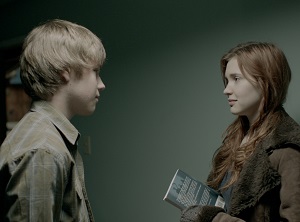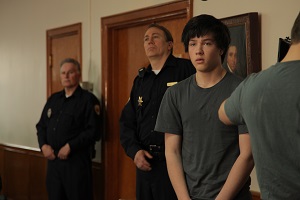 One of the major hot-button topics within the social and political landscape of the United States at present, it’s more than a little surprising to find a relevant film confronting the issue of gun control from a Canadian point of view. And while Blackbird isn’t an examination of the wisdom or right to bear arms, it does concern itself with the primary fuel for that conversation: child violence. Even the most entrenched gun lobby advocate feels a sick twinge when a school gets shot all to hell, and while the means towards the end result varies depending on the person offering an opinion, all want to rid the world of tragedies like those seen in Columbine or Newtown. Blackbird is about how one community’s paranoia and fear over just such an attack, and how this brings about a miscarriage of justice almost as destructive as what could be found on the wrong end of a barrel.
One of the major hot-button topics within the social and political landscape of the United States at present, it’s more than a little surprising to find a relevant film confronting the issue of gun control from a Canadian point of view. And while Blackbird isn’t an examination of the wisdom or right to bear arms, it does concern itself with the primary fuel for that conversation: child violence. Even the most entrenched gun lobby advocate feels a sick twinge when a school gets shot all to hell, and while the means towards the end result varies depending on the person offering an opinion, all want to rid the world of tragedies like those seen in Columbine or Newtown. Blackbird is about how one community’s paranoia and fear over just such an attack, and how this brings about a miscarriage of justice almost as destructive as what could be found on the wrong end of a barrel.
The film stars Connor Jessup as Sean Randall, an angry fifteen year old living in a rural Canadian community that appears to be something of a second choice for the kid. Sean lives with his divorced father (Michael Buie), a man that seems to earnestly care about his son and their rapidly eroding relationship. Although Sean’s dad does seem to be making an effort to connect with the boy, hunting trips and hockey games don’t seem to appeal to Sean, who rocks an all-black wardrobe (with the compulsory studded leather jacket), and matching black nail polish.
 Predictably oppressed in school because of his carefully cultivated “outsider” status, Sean’s world is turned upside-down when the girlfriend of the most popular jock in school starts expressing interest in him. Although Sean does his best to return the sideways affections of this Deanna girl (Alexia Fast), his inability to drop the Goth posturing, not to mention Deanna’s fear of social suicide, keep the two at arm’s length. Getting a taste of emotional fulfillment ends up being too much for Samuel to bear, however, and before long Deanna’s boyfriend, the super-jock, gets involved.
Predictably oppressed in school because of his carefully cultivated “outsider” status, Sean’s world is turned upside-down when the girlfriend of the most popular jock in school starts expressing interest in him. Although Sean does his best to return the sideways affections of this Deanna girl (Alexia Fast), his inability to drop the Goth posturing, not to mention Deanna’s fear of social suicide, keep the two at arm’s length. Getting a taste of emotional fulfillment ends up being too much for Samuel to bear, however, and before long Deanna’s boyfriend, the super-jock, gets involved.
After roughing Samuel up a bit, the asshole-boyfriend informs the would-be usurper than an ass-whipping will be the least of the Goth’s worries the next time Samuel tries to contact Deanna: no, the jock will just kill him. Heartbroken and afraid, Samuel turns to the school’s guidance counselor, who urges the kid to get his angst out via the pen. Feeling somewhat relieved, Samuel posts his fictional revenge fantasy online, then makes a few macho threats in a chat room about killing Mr. Jock-Man if the jerk ever steps to him again.
 The resulting shit-storm is more destructive than anybody could have foreseen. The cops arrest Samuel after getting wind of his story and the chat logs, then charge him under the assumption that they caught a psycho before he commenced his own bloodbath. Confused by the whole mess, and unsure of what exactly he’s done wrong, Samuel tries to explain what happened only to wilt under the fire and brimstone condemnations of the police, court, and municipality. Like some sort of virus that has infected their community, the townsfolk simply want Samuel out: away. Little concern seems to be paid to what may have caused all this drama, or of the circumstances that may have brought the teenager to such a desperate state, for this is a much more difficult proposition than simply locking someone away and throwing away the key.
The resulting shit-storm is more destructive than anybody could have foreseen. The cops arrest Samuel after getting wind of his story and the chat logs, then charge him under the assumption that they caught a psycho before he commenced his own bloodbath. Confused by the whole mess, and unsure of what exactly he’s done wrong, Samuel tries to explain what happened only to wilt under the fire and brimstone condemnations of the police, court, and municipality. Like some sort of virus that has infected their community, the townsfolk simply want Samuel out: away. Little concern seems to be paid to what may have caused all this drama, or of the circumstances that may have brought the teenager to such a desperate state, for this is a much more difficult proposition than simply locking someone away and throwing away the key.
Blackbird definitely comes into its own during this second act, when Samuel is forced to confront the person he has become, and where that’s landed him. Yet the strongest points of the movie come when they should, in the third act, when Samuel begins to understand what it means to be a responsible, culpable adult. Free of his Goth persona and any fear of what anybody might think of him, Samuel eventually finds the strength to live honestly, and to stand up to those things that frighten him. This doesn’t necessarily mean a person has to fight back in the physical sense, for if Blackbird has one message, it is that violence (or the threat of it) solves nothing. What Samuel learns by the end of the film, what director Jason Buxton is likely trying to say, is that strength comes from confidence in one’s self, and the courage a man or woman displays when offering that up to the world without any filters.
 A story that tracks this growth in Samuel, as well as the kid’s father and prospective girlfriend, Blackbird is admittedly rough around the edges, and somewhat confining. The tale of a depressed, lonely teenager that ends up spending a healthy chunk of time in the clink, the movie does drag a bit here and there, and emits a very confining vibe at times. And while this may have been a deliberate choice by Mr. Buxton to convey Samuel’s isolation, it works a little too well at times, and pulls the narrative down a bit.
A story that tracks this growth in Samuel, as well as the kid’s father and prospective girlfriend, Blackbird is admittedly rough around the edges, and somewhat confining. The tale of a depressed, lonely teenager that ends up spending a healthy chunk of time in the clink, the movie does drag a bit here and there, and emits a very confining vibe at times. And while this may have been a deliberate choice by Mr. Buxton to convey Samuel’s isolation, it works a little too well at times, and pulls the narrative down a bit.
An interesting look at how social media and 24-hour news exposure is influencing the way we look at our children and the dumb shit that so often comes out of their mouths, Blackbird is an especially relevant story. Playing at this year’s Seattle International Film Festival, it will be interesting to see how this one plays out in a city generously populated by persecuted musicians, artists, and dreamers who moved to the cultural hub of the Pacific Northwest to live freely and without persecution. Rough as this film may be at times, it still might just give a voice to all those lonely souls who see a little of what they once were in Samuel: a lonely kid with lots to say and no one to listen.





Comments on this entry are closed.